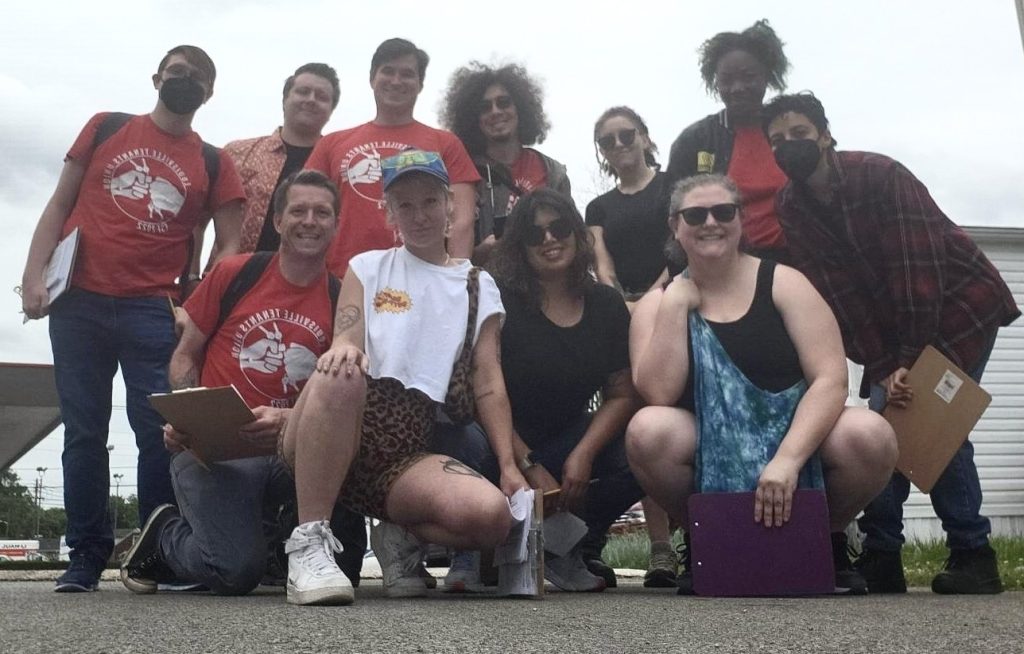
Members of the Louisville Tenants Union, ready with clipboards and pens, on a day they canvass their neighbors in eastern Kentucky. Josh Poe is at left in the front row. Photo courtesy of Josh Poe
I want to tell you a story about where I’m from. I’m from Appalachia and grew up in northeastern Kentucky on my papaw’s small tobacco farm and as a kid I worked in tobacco fields.
After we harvested my papaw’s tobacco, I would go work for the surrounding landowners.
Tobacco work was piecework. You were paid 7 cents for every stick you cut. My papaw told me to demand 10 cents for every tobacco stick I cut and to make sure everyone else who worked in the field also got 10 cents. He said if you only take it for yourself, they will fire everyone else, keep you, and then pay you 7 cents when it’s all said and done. That was the best training on self-interests and power that I ever got.
So at 10 or 11 years old, we went out to negotiate with those landowners. They were terrible to us. They would put us 40 feet in the air top of a tobacco barn in the middle of August and keep us there all day. Poor kids were given excused absences from school so we could work in these fields. They told us it was part of our heritage and that in Appalachia we help our neighbors.
Later on, in the late ’90s, globalized racial capitalism found people from Mexico who would work for less than hillbilly children. And we organized with them to get 10 cents a stick as well.
Years later I was in Seattle working at a nonprofit and I read a Human Rights Watch report about child labor in tobacco fields. I didn’t even realize that I grew up a child laborer in the richest country in the history of the world. That I grew up without indoor plumbing in the richest country in the history of the world. Racial capitalism told me a lie about my community: That our poverty was the result of our own belligerence and ignorance. I was an angry little kid who became an even angrier adult. I’m talking about how it feels to be used. How it feels to not be seen. How it feels to be a disposable labor force. How it feels to be somebody’s else’s trash.
I went to visit my papaw recently. He is 94 and he feels like a burden because he is not able to work anymore. He told me a story about how he recently had to call his neighbor for help. And he looked me in the eye and said, “I would just as soon put a gun to my head and pull the trigger as to ask anybody for help.”
And he meant it. This man has spent his entire life being selfless. He raised a bunch of other people’s kids. He was a sharecropper who was able to get a small piece of land because of the New Deal and he never left that farm. He never took a vacation. He never went to church. He never left his farm except to get groceries or farm supplies or go to the hospital, and then only when it was necessary. He is the perfect worker. He’s been organized by racial capitalism against his own self-interest so that now he is contemplating ending his life because he is no longer productive and fears that he might be a burden to someone else.
If we don’t even believe we deserve help, how can we believe that we deserve power?
And I see that everywhere I organize. I see it in myself and I see it in our leaders. We have people in eastern Kentucky who don’t believe they deserve flood relief and are terrified that someone will talk bad about them if they get it. We know Black mothers in Louisville who need Section 8 but are too proud to take it. We have leaders who can’t hold each other accountable because they are so afraid of actually being powerful. So many of our people have been organized against their own self-interest into a set of beliefs and behaviors that keep them powerless. And if we don’t even believe we deserve help, how can we believe that we deserve power?
When I was 12 years old, a prison was proposed to be built on the farm next to my papaw’s. My mother organized to stop it and won. My mother did not have a good life. She suffered abuse, trauma, addiction, and mental illness. This was the only time I got to see my mother be powerful. It was the only time I got to see my mother win. This is why I believe in organizing.
The Kentucky Democratic Party didn’t run candidates in over 40 districts in Kentucky last year. And when we asked why they said there was “no chance to win” and they were scared of being harassed. That it’s not safe to organize there. That we cannot win.
They say that they “can’t find people to run there.” Which indicates that they only show up at election time. They have no base and no organizing strategy. I feel angry as fuck about that.
I’m angry that it’s so easy to abandon people who have no power and don’t believe they deserve help.
I’m angry that we have allowed the GOP to organize a small minority of people to ruthlessly dominate our state. A lot of people outside Kentucky think they understand why that happened. But I don’t believe that the GOP is winning in Kentucky because people where I’m from hate Black people or LGBTQ people. They’re winning because one side is organizing and the other side is not. One side is clear about power and the other side is not.
[RELATED ARTICLE: The Rise and Fall of the National Tenants Union]
I’m from a place where about 70 percent of people do not vote. I’m from a place devastated by opioid addiction. And like many people who experienced childhood violence, trauma, and poverty, I became addicted to opiates as a teenager and lost 10 years of my life to heroin addiction. I lost years living on the street, hustling to survive, going to jail, and sleeping wherever I could. I’ve lost more family members and friends than I can count. Addiction is what happens when we don’t have any place to put our pain. Addiction is what happens when we don’t politicize our trauma through building power.
There are over 10,000 registered Democrats in Letcher County, but just over a third of them voted in the last gubernatorial election. Rather than respond to this with an analysis, the Kentucky Democratic Party writes these voters off as too ignorant or racist to understand their own interests. As if the Kentucky Democratic Party has anything to do with their material interests.
But we see these abandoned voters as an opportunity to move the state to the left of the Kentucky Democratic Party. And we do that by building tenant unions.
Over 30 percent of Kentucky’s population rents their homes, and many counties in eastern Kentucky are over that average, which is a huge base of people with shared interests, especially in a place where only about 30 percent of the people vote. Tenant unions run campaigns for policies like rent control and good cause evictions that directly impact tenants’ material lives. These campaigns connect tenants who live in HUD properties, under corporate landlords, and in trailer parks, and help them push back directly against abuses by those who control where they live. These shared self-interests are how tenant organizers are able to work across the lines typically used to divide the working class.
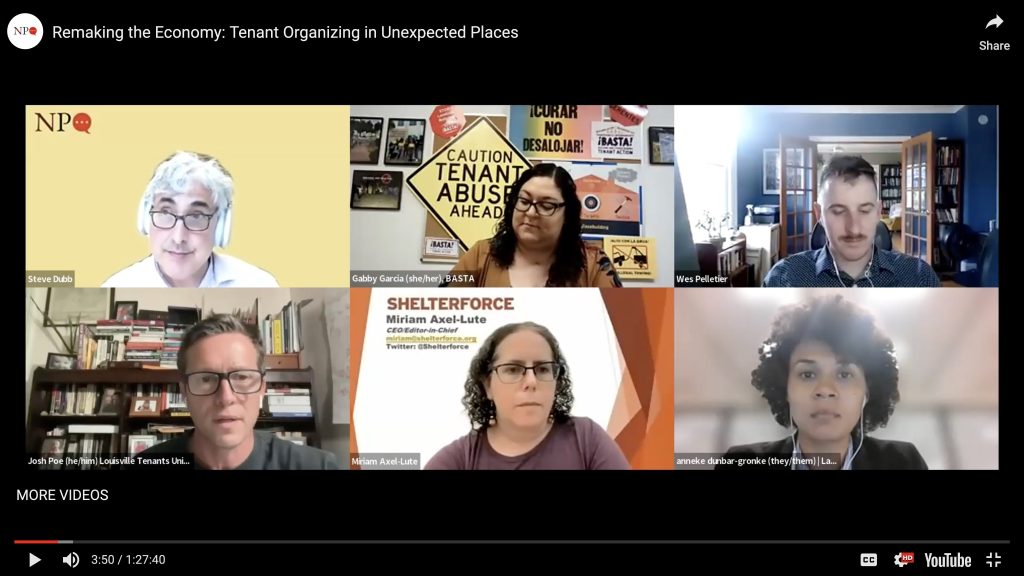
Josh Poe, in lower left window, was one of the speakers at “Remaking the Economy: Tenant Organizing in Unexpected Places,” a Shelterforce/NPQ webinar, on July 12.
The tenant union is how we win in the South. Tenant organizing is the only space where I’ve seen a 75-year-old white retired truck driver stand up and make a public statement of solidarity with a trans rights campaign. That happened because of organizing. That happened because someone was self-interested and power hungry (in a good way) enough to canvass his trailer park, knock on his door, and agitate him into building power. Because through that process he realized that the people who were threatening the lives of trans people were the same people profiting from his rent increases.
Racial capitalism was designed to keep us separated geographically, but also separate in our minds by believing that we have opposing self-interests. That class solidarity does not exist.
Racial capitalism wants us to believe that Black people in Louisville and white people from east Kentucky have different self-interests. But when you dig into it, so much about the material conditions in our communities are exactly the fucking same. Wolfe County, the poorest in eastern Kentucky, has a median income of about $22,000 a year and a poverty rate of 36 percent, according to an analysis of 2020 U.S. Census estimates. That’s the lowest income and the 18th highest poverty rate among the among the nation’s 3,000 counties. These statistics are very similar to Census tracts in the predominantly Black areas of West Louisville. Our low wages have fueled industrial capital for 100 years, and today our depressed land values are fueling real estate speculation.
My niece and nephew live in the same dilapidated trailer that I grew up in, and I’m scared of what kind of life they will have in eastern Kentucky or even if they will be able to stay.
When coal companies brought Black workers to Appalachia to work in the mines, they built separate towns for them. Separate schools and separate churches. Our entire housing system was designed to crush cross-racial solidarity to keep us from organizing. That’s what segregation and Jim Crow were for.
We need to organize around our analysis of local power, around our rent and our labor, and the people most impacted have to lead that work. In Appalachia unemployment is over 40 percent. We cannot organize around labor only anymore, not when real estate capital controls our lives. We live in a world designed by Herbert Hoover and Donald Trump’s father. We are living in the corpse of financialized real estate capital and that is why our lives are so fucking hard.
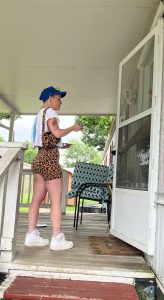
A resident opens the door to a member of the Louisville Tenants Union. Photo by Josh Poe
I am so proud of the leaders in the Louisville Tenants Union. I organize with a group of queer people, Black people, and trans people who regularly go into trailer parks and canvass for 5 or 6 hours on a Sunday. They do that because they know what’s at stake. They know the costs of not organizing. We can win in Kentucky. When I say we can take over Kentucky, I believe that. I don’t mean just trying to block the GOP. I’m talking about winning. I believe we can build an independent base of working class people in Kentucky—and other places in the South with similar histories and politics—that is to the left of the Democratic Party. If we organize.
But we have to organize like we believe that. We need to stop listening to the people who tell us we can’t win in the South and start organizing the people who don’t have any other choice but to win.

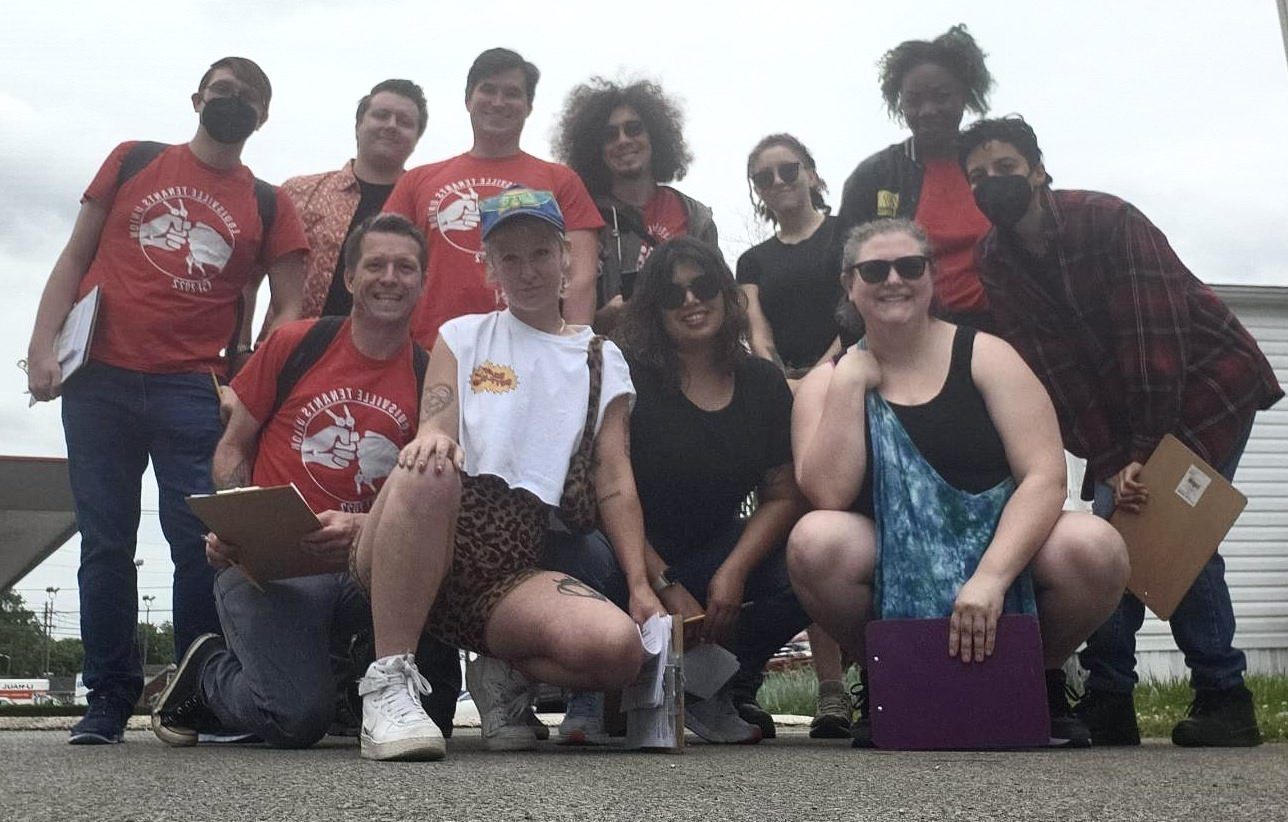


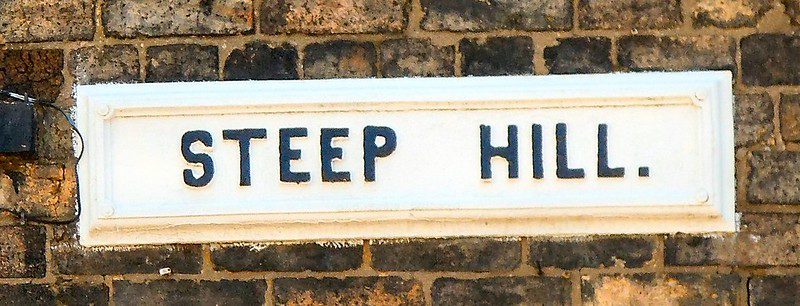
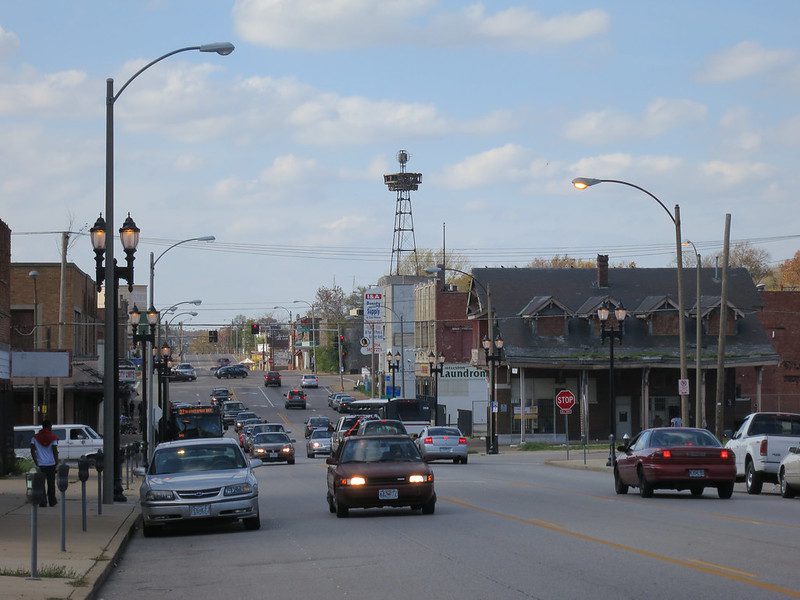
Comments